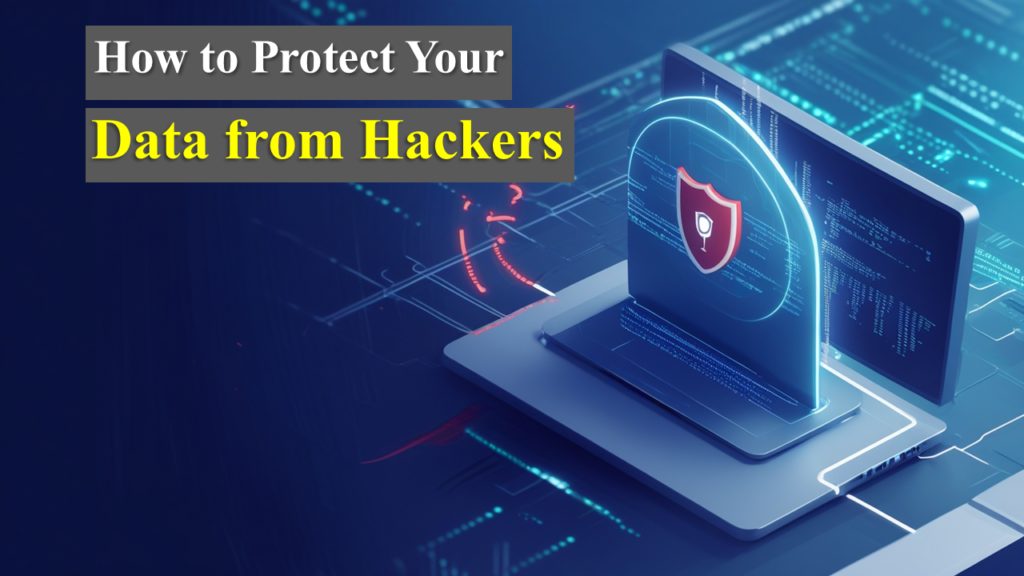Introduction
In today’s digital world, protecting your data is more important than ever. Hackers are always looking for ways to steal personal information, such as passwords, bank details, and personal messages. If you do not take the right steps, your data can be at risk.
This guide will explain simple steps to help you keep your data safe from hackers. Whether you are using a computer, smartphone, or tablet, these tips will help protect your personal information.
1. Use Strong Passwords
A password is like a key to your online accounts. If your password is weak, hackers can easily break into your account. Here’s how to create a strong password:
- Use at least 12 characters
- Mix uppercase & lowercase letters
- Include numbers & special characters (#, @, !, etc.)
- Avoid common words like “password123”
- Use different passwords for each account
💡 Tip: Use a password manager to store your passwords safely.
2. Enable Two-Factor Authentication (2FA)
Two-Factor Authentication (2FA) adds an extra layer of security to your account. Even if a hacker gets your password, they will need a second code to log in.
How 2FA Works:
- You enter your password
- A one-time code is sent to your phone or email
- You enter the code to log in
💡 Tip: Always enable 2FA for email, banking, and social media accounts.
3. Keep Your Software Updated
Hackers look for weaknesses in old software. Companies release updates to fix these problems. If you don’t update your software, hackers can exploit security holes and steal your data.
- Update Windows, macOS, and Linux regularly
- Keep your phone’s operating system up to date
- Update apps & browsers (Chrome, Firefox, Edge)
💡 Tip: Turn on automatic updates to stay protected.
4. Avoid Public Wi-Fi for Sensitive Transactions
Public Wi-Fi (at coffee shops, airports, malls) is not secure. Hackers can easily steal your data while you are connected.
Never do this on Public Wi-Fi:
- Online banking
- Shopping with your credit card
- Logging into important accounts
- Use a VPN (Virtual Private Network) if you must use public Wi-Fi. A VPN hides your online activity from hackers.
💡 Tip: If possible, use mobile data instead of public Wi-Fi.
5. Be Aware of Phishing Scams
Phishing is when hackers trick you into giving personal information. They send fake emails or messages pretending to be from a trusted company.
Signs of a Phishing Email:
- Urgent message (“Your account will be closed!”)
- Fake sender email (e.g., support@amaz0n.com)
- Suspicious links (Hover over the link before clicking)
✔️ Never click on unknown links or download attachments from strangers.
💡 Tip: If an email looks suspicious, contact the company directly.
6. Secure Your Smartphone
Your phone has a lot of personal data, including contacts, messages, and banking apps. Protect it by:
- Using a strong PIN, password, or fingerprint
- Turning on Find My Device (in case it gets lost)
- Not downloading unknown apps from untrusted sources
💡 Tip: Always lock your phone when not in use.
7. Use Antivirus & Anti-Malware Software
Antivirus software protects your device from viruses, malware, and spyware that hackers use to steal data.
- Install trusted antivirus software (Norton, McAfee, Bitdefender)
- Run regular scans to check for threats
- Keep your antivirus updated
💡 Tip: Be careful when downloading free software—some contain viruses.
8. Back Up Your Data Regularly
If a hacker attacks your device, you could lose all your important files. Backing up your data ensures you don’t lose important information.
- Use an external hard drive
- Store files in cloud storage (Google Drive, OneDrive, Dropbox)
- Set up automatic backups
💡 Tip: Keep at least two backups in different locations.
9. Be Careful with Social Media
Hackers can use your public information to guess your passwords or steal your identity.
- Set your profile to private
- Avoid sharing personal details (birthday, address, phone number)
- Do not accept friend requests from strangers
💡 Tip: If a friend sends a suspicious link, ask them if it’s real before clicking.
10. Log Out from Shared Devices
If you log into your account on someone else’s computer or a public device, make sure to log out completely when you’re done.
- Never select “Remember Me” on shared computers
- Use incognito mode when browsing on public devices
💡 Tip: Clear browsing history and cookies after using a public computer.
11. Check Your Online Accounts Regularly
Hackers might break into your accounts without you noticing. Check your accounts regularly for any suspicious activity.
- Look for unknown logins or transactions
- Change passwords immediately if something looks wrong
- Enable email notifications for login attempts
💡 Tip: Use Have I Been Pwned (https://haveibeenpwned.com/) to check if your email has been hacked.
Conclusion
Protecting your data doesn’t have to be difficult. By following these simple steps, you can keep your information safe from hackers.
Quick Recap:
- Use strong passwords and 2FA
- Keep software updated
- Avoid public Wi-Fi for banking
- Watch out for phishing scams
- Secure your smartphone & social media
- Install antivirus software
- Back up your important data
Stay safe online and protect your data from hackers!
Frequently Asked Questions (FAQs)
Q1: What should I do if I think my account has been hacked?
- Change your password immediately
- Enable two-factor authentication (2FA)
- Check for unauthorized activity
Q2: Is using the same password for multiple accounts bad?
Yes! If one account gets hacked, all your accounts could be at risk. Always use unique passwords.
Q3: Can hackers see what I do on public Wi-Fi?
Yes! Hackers can steal your data if you use public Wi-Fi without a VPN.
Q4: Do free antivirus programs work?
Some do, but paid antivirus offers better protection.
Q5: How often should I back up my data?
At least once a week, or more if you have important files.
That’s it! Hope this guide helps you stay safe from hackers.


